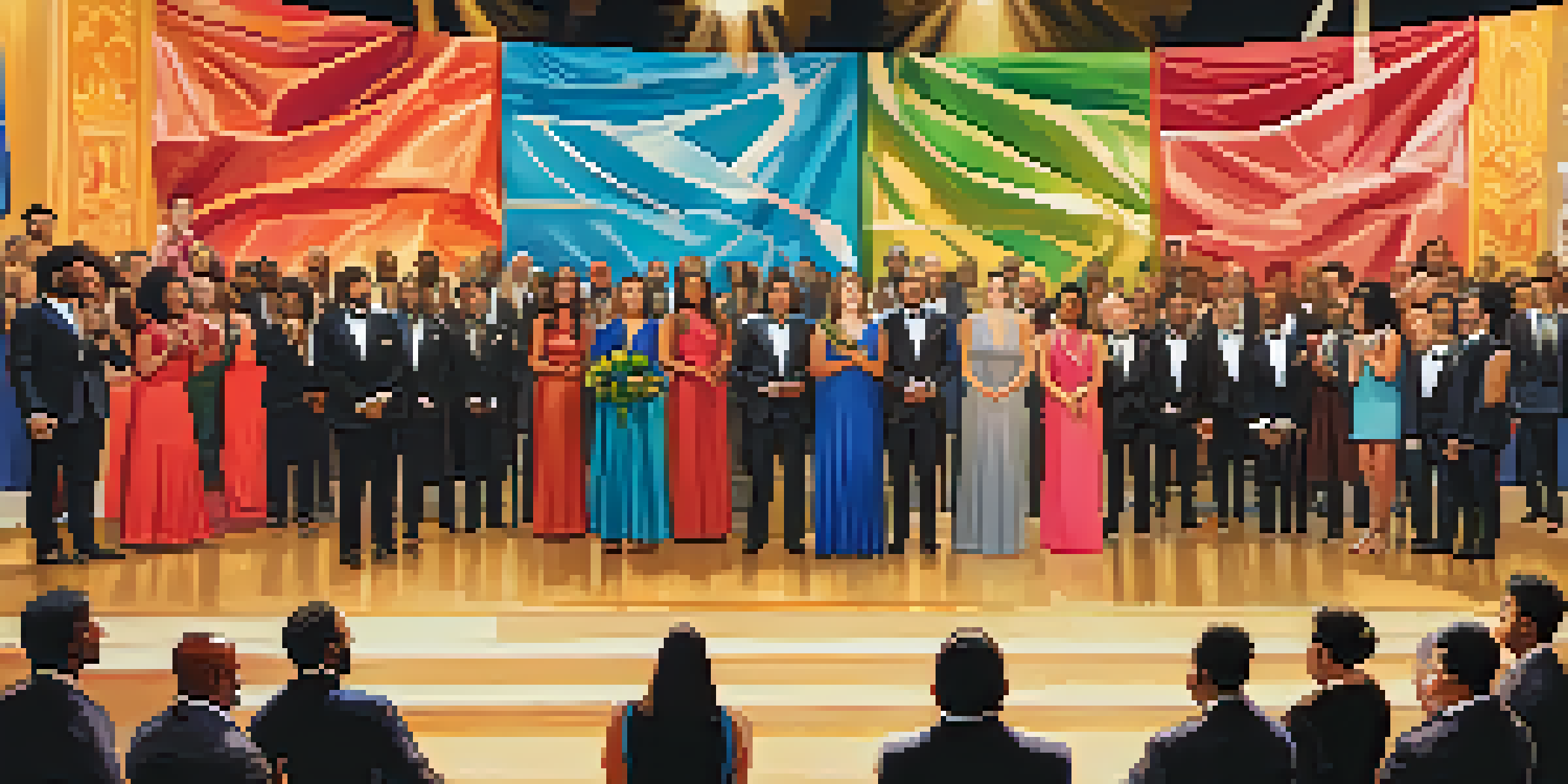The Role of Award Shows in Promoting Diversity in Film and TV

Understanding the Importance of Diversity in Entertainment
Diversity in film and television isn't just a trend; it's a necessity. It reflects the society we live in, showcasing a mosaic of experiences and perspectives. When audiences see themselves represented on screen, it fosters a sense of belonging and connection.
Diversity is being invited to the party; inclusion is being asked to dance.
Moreover, diverse storytelling enriches the narrative landscape, allowing for more innovative and relatable content. Imagine a world where every voice matters—where stories from different cultures, backgrounds, and identities are told. This diversity can lead to groundbreaking films and shows that resonate with wider audiences.
Ultimately, embracing diversity in entertainment encourages empathy and understanding. It challenges stereotypes and broadens the horizons of storytelling, paving the way for a more inclusive industry.
The Historical Context of Awards and Recognition
Award shows have a long history of shaping the film and television landscape. From the Oscars to the Emmys, these ceremonies not only celebrate artistic achievement but also reflect societal values. Historically, many awards have faced criticism for their lack of diversity, prompting calls for change.

The push for more inclusive nominations and winners has gained momentum in recent years. Movements like #OscarsSoWhite highlighted the need for greater representation among nominees, sparking conversations about diversity in Hollywood. This scrutiny has compelled award shows to reevaluate their practices and criteria.
Diversity Reflects Society's Values
Diverse representation in entertainment fosters connection and enriches storytelling by showcasing a wide array of perspectives.
As a result, many award shows have implemented changes to promote inclusivity, such as expanding voting bodies and creating new categories that celebrate diverse storytelling. This evolution signals a shift towards a more equitable industry.
Award Shows as Platforms for Underrepresented Voices
One of the most powerful aspects of award shows is their ability to amplify voices that are often overlooked. Winning an award can catapult a creator's career, providing them with a platform to share their stories. This visibility is crucial for underrepresented groups in the industry.
The beauty of the world lies in the diversity of its people.
When diverse voices are celebrated, it opens doors for other artists who share similar backgrounds. For example, when films centered around minority experiences win prestigious awards, it encourages studios to invest in more diverse narratives. This cycle of recognition and investment can lead to a richer array of content.
Furthermore, acceptance speeches and moments of recognition often serve as powerful statements for social change. These moments can inspire viewers and other creators to advocate for diversity within their own projects and communities.
The Role of Award Shows in Shaping Industry Standards
Award shows play a crucial role in setting standards within the entertainment industry. They influence what stories are told and who gets to tell them. When awards begin to recognize diverse talent, it sends a clear message to studios about the importance of inclusivity.
This influence isn't limited to just those who win; it impacts all nominees and participants. For instance, being nominated can increase a film's visibility and funding opportunities, encouraging the creation of more diverse projects. It becomes a self-reinforcing cycle that benefits the industry as a whole.
Awards Influence Inclusivity Standards
Award shows have the power to set industry standards, encouraging studios to embrace diverse talent and narratives.
Moreover, as more award shows prioritize diversity, it can lead to systemic changes. This could include more diverse hiring practices and a commitment to creating a more inclusive environment behind the camera as well.
Challenges and Criticisms of Award Shows
Despite their potential for promoting diversity, award shows are not without their challenges and criticisms. Many argue that the changes are merely performative, lacking genuine commitment to long-term inclusivity. Critics often point to the disparity between nominations and actual representation in the industry.
Additionally, there is ongoing debate about what constitutes diversity. Is it enough to have a few nominees from underrepresented groups, or should the focus be on systemic change throughout the industry? These discussions are vital as they push award shows to reevaluate their approaches continually.
Navigating these challenges requires transparency and accountability from award show organizers. They must commit to not only recognizing diverse talent but also actively supporting the creation of inclusive content.
The Future of Diversity in Award Shows
Looking ahead, the future of diversity in award shows seems promising, but it requires ongoing effort. Many organizations are recognizing the need to adapt and evolve, introducing initiatives aimed at increasing diversity among voters and nominees. This proactive approach can create lasting change within the industry.
Moreover, the rise of streaming platforms has diversified the types of stories being told. These platforms often prioritize unique narratives that may have been overlooked by traditional studios, expanding the pool of talent and stories available for recognition.
Progress Requires Ongoing Commitment
While strides have been made toward diversity in award shows, sustained efforts and accountability are essential for long-term change.
As award shows continue to adapt, they will likely play an even more significant role in shaping the narrative landscape. By championing diverse voices, they not only enhance the industry but also enrich the viewing experience for audiences around the globe.
Celebrating Progress and the Road Ahead
While significant strides have been made toward diversity in award shows, it's essential to celebrate the progress while acknowledging the journey ahead. The increased visibility of diverse talent is a step in the right direction, but the goal is to create a sustainable and equitable industry.
Celebrating milestones, such as historic wins for underrepresented artists, serves as a reminder of how far we've come. These moments inspire future generations and encourage them to pursue their creative passions, knowing that their voices matter.

Ultimately, the ongoing dialogue about diversity in film and television is crucial. By continuing to advocate for change and holding award shows accountable, we can work towards an entertainment landscape that truly reflects the richness of our society.